Ramadan is one of the largest religious observations in the world and will begin this Sunday, May 5. This holy month will be celebrated by 1.8 billion Muslims all over the world and approximately 2.5 million Muslims over the UK.
As a result, many restaurants across the UK are set to offer special Ramadan menus. Challenging your staff to add Ramadan-themed dishes will be a great way to test their creativity, particularly for your hospitality apprentices.
What is Ramadan?

The holy month of Ramadan will begin this Sunday, May 5, and end on Tuesday, June 4, culminating in the spiritual festival of Eid al-Fitr. Ramadan is the ninth month of the Islamic calendar and is observed by undertaking several activities, including:
- Sawm (fasting)
- Zakat and Sadaqah (almsgiving)
- Taraweeh prayer (Sunni Muslims)
- Commemorating Nights of al-Qadr (Shia and Sunni Muslims)
- Reading the Qu’ran
- Abstaining from all bad deeds and staying humble
The month commemorates the first revelation of the Qu’ran to the Prophet Mohammed, and its annual observance is regarded as one of the Five Pillars of Islam.
Fasting

The act of fasting during Ramadan is meant to redirect an individual’s attention away from worldly distractions in order to focus on the maintenance of the soul. Fasting also allows people to practice discipline and self-restraint.
Fasting doesn’t apply to everyone, though. Children who have not yet reached puberty, people with illnesses and disabilities are exempt, as are people who are travelling and pregnant. Those who are unable to fast can make it up on later days.
The fast takes place between two events of each day: Suhoor and Iftar.
Suhoor is the day’s pre-fast meal and is consumed before dawn. It is usually done around 4:00 AM and followed by the Fajr prayer. After Suhoor no food should be consumed before sunset when Iftar, the main meal, is served.
So, to give some inspiration to your staff and apprentices to include some spectacular Ramadan recipes to your menus, here are a few dishes from allrecipes.com that they can cook for the holy month:
Suhoor

If your restaurant has an early start, or if your employees are observing Ramadan, you might want to consider whipping up a quick and nutritious Suhoor meal. Suhoor should be small, straightforward yet hearty enough to keep people going until sunset. The recipe below is also something you can sling to busy commuters who need an extra hit of food before the sun cracks into the sky.
Egyptian Feta Cheese Omelette Roll
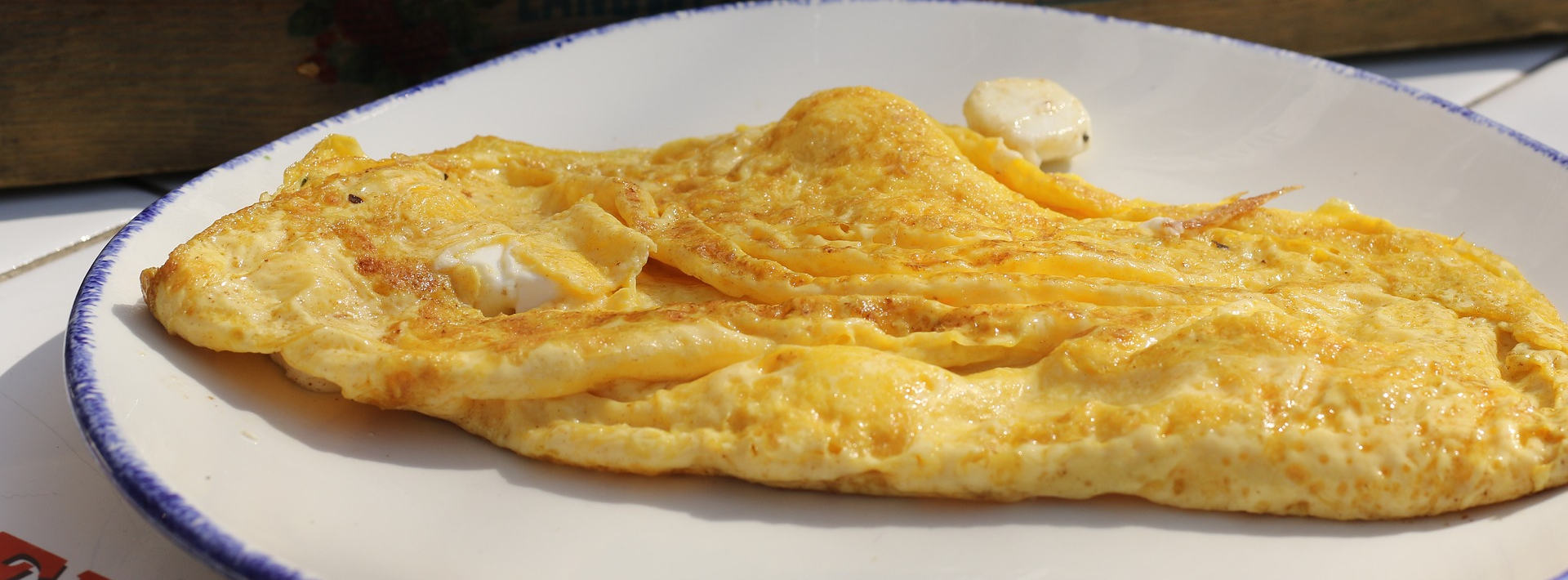
Ingredients
- 4 eggs
- ½ tsp black pepper
- Tbs crumbled feta cheese
- 1 tsp milk
- 1 tbs vegetable oil
In a bowl, beat the eggs and pepper together. In another bowl combine the cheese and milk.
Heat the oil in a large non-stick skillet over medium-high heat. Pour in the eggs, ensuring the bottom of the pan is covered. When the edges appear cooked, place the feta mixture in a line in the centre of the eggs. Using a spatula, fold the eggs over the top and bottom of the cheese.
Serve with sliced cucumbers and Baladi bread.
Iftar
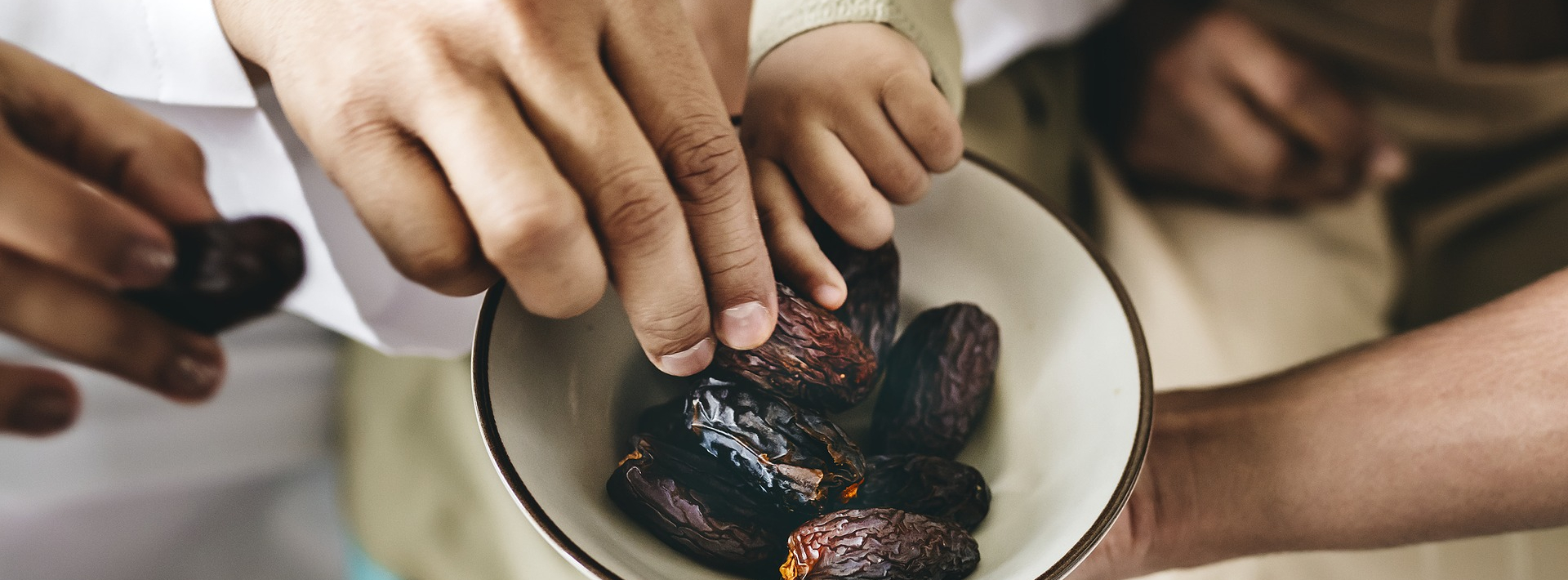
Iftar is the meal that comes after the traditional eating of dates to break the fast and the Maghrib prayer, all of which occur after sunset.
The time Iftar occurs depends on where in the world you are. The fast can last a long time on some days, with the sun going down at 9:13 PM on June 3rd, the second-last day of Ramadan. Check out this timetable by the East London Mosque for Iftar times in the UK.
After sunset prayers, Muslims are free to eat a big feast. While many people prefer to eat at home, some groups and families make a night of it and go out.
Here are some cool recipe ideas to keep in mind to serve for Ishtar.
Turkish Fish Stew
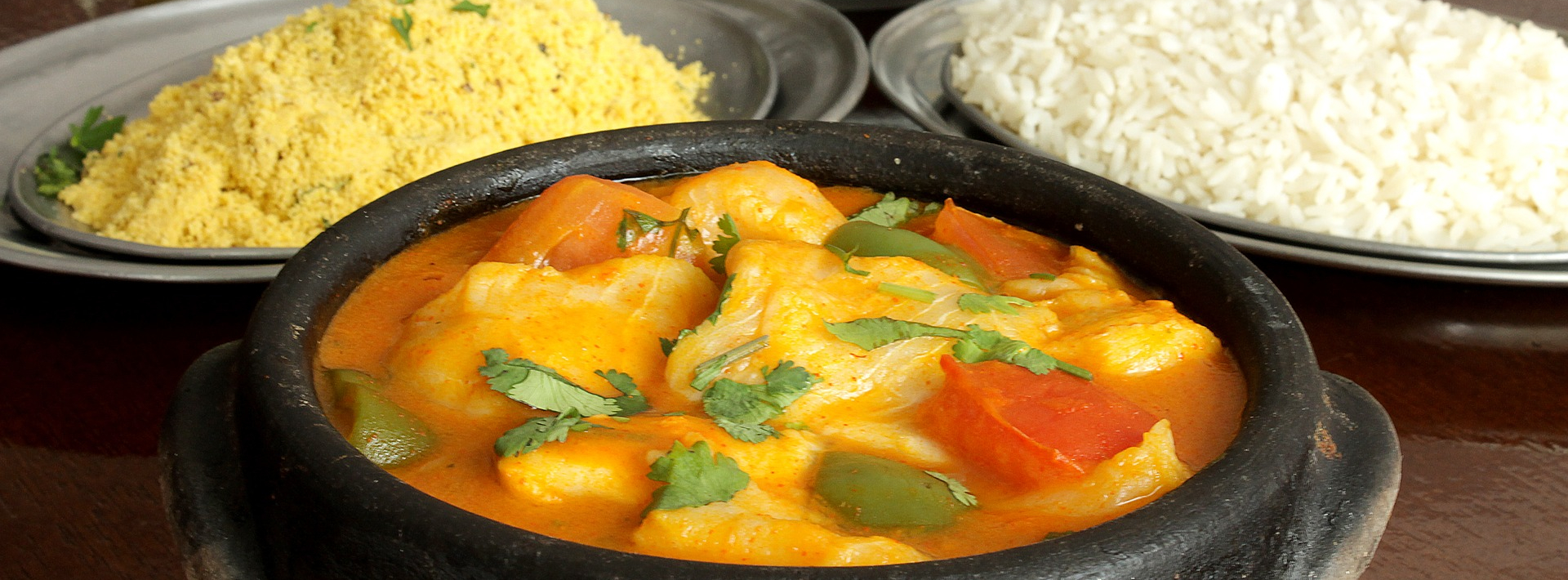
This is a non-traditional variant of fish stew that blends various Mediterranean influences. It’s tasty, aromatic and filling. What more could you want?
Ingredients
- 3 cups water
- 1 ½ cups dry couscous
- 2 tbs olive oil
- 1 small white onion, chopped
- 1 green bell pepper, chopped
- 2 cloves of garlic, minced
- 1 cup marinated artichoke hearts
- 2 tsp capers
- 12 small green olives
- 1 can chopped stewed tomatoes
- 2 tablespoons white wine
- 1 tbs lemon juice
- 1 cup water
- 2 tsp sumac powder
- 1 ½ tsp crushed red pepper flakes
- 1 tsp dried basil
- 1 tsp cumin
- 1 tsp minced ginger
- Black pepper to taste
- 1 pound tilapia fillets, cut into chunks
In a medium saucepan, bring 3 cups of water to a boil and stir in the couscous. Remove from heat, cover and let sit.
Heat the olive oil in a skillet over medium heat, and sauté the onion and green pepper until tender. Add the garlic and cook for 2 minutes. Add the artichoke hearts, capers and olives. Stir in the tomatoes, wine, lemon juice and 1 cup water. Season with sumac powder, red pepper, basil, cumin, ginger and pepper.
Bring the mixture to a boil and add the fish. Reduce heat and simmer until the fish is easily flaked with a fork. Serve with couscous.
Duck Fesenjan
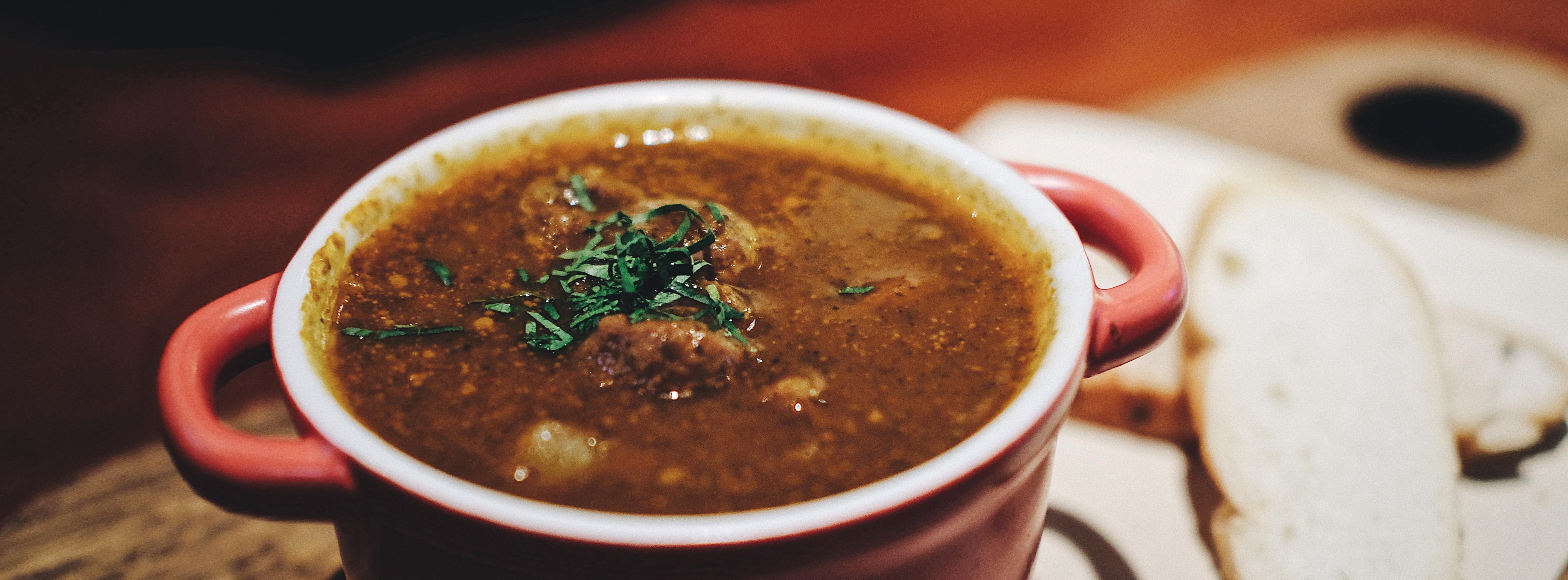
This recipe uses duck legs instead of the traditional chicken while maintaining the classic ingredients of pomegranate molasses and ground walnuts. Tailor it to the tastes of your guests.
Ingredients
- 8 duck legs
- Salt and pepper
- 2 tbs vegetable oil
- 60ml water
- 3 tbs olive oil
- 300g diced onion
- 1 tsp ground turmeric
- ½ tsp ground cinnamon
- 1/8 tsp ground nutmeg
- 1420ml chicken stock
- 160ml pomegranate molasses
- 60ml honey
- 360g walnut halves
Season duck legs all over with salt and black pepper.
Heat vegetable oil in a large pan over high heat. Lay in duck legs. Fry until golden brown on all sides. Transfer the legs to a plate and remove the fat from the pan to use later.
Pour water into the pan and bring to the boil while scraping the browned bits of food off of the bottom of the pan with a wooden spoon. Remove from the heat.
Heat 2 tablespoons duck fat and olive oil in a heavy casserole pot over medium heat. Cook and stir in onion until golden brown. Add turmeric, cinnamon and nutmeg; cook and stir until fragrant.
Add chicken stock, pomegranate molasses, honey and reserved sauce from the pan into the onion and spice mixture in the casserole pot. Bring to a simmer.
Grind walnuts to a fine powder in a food processor.
Cook and stir walnuts in a pan over medium heat until fragrant. Stir ground walnuts into the casserole pot. Add the browned duck legs. Reduce heat and simmer until duck legs are tender, approximately 3 to 4 hours.
Bring stock mixture to the boil. Cook until reduced and desired sauce consistency is reached. Season with salt. Ladle sauce over duck legs.
Lamb Tagine
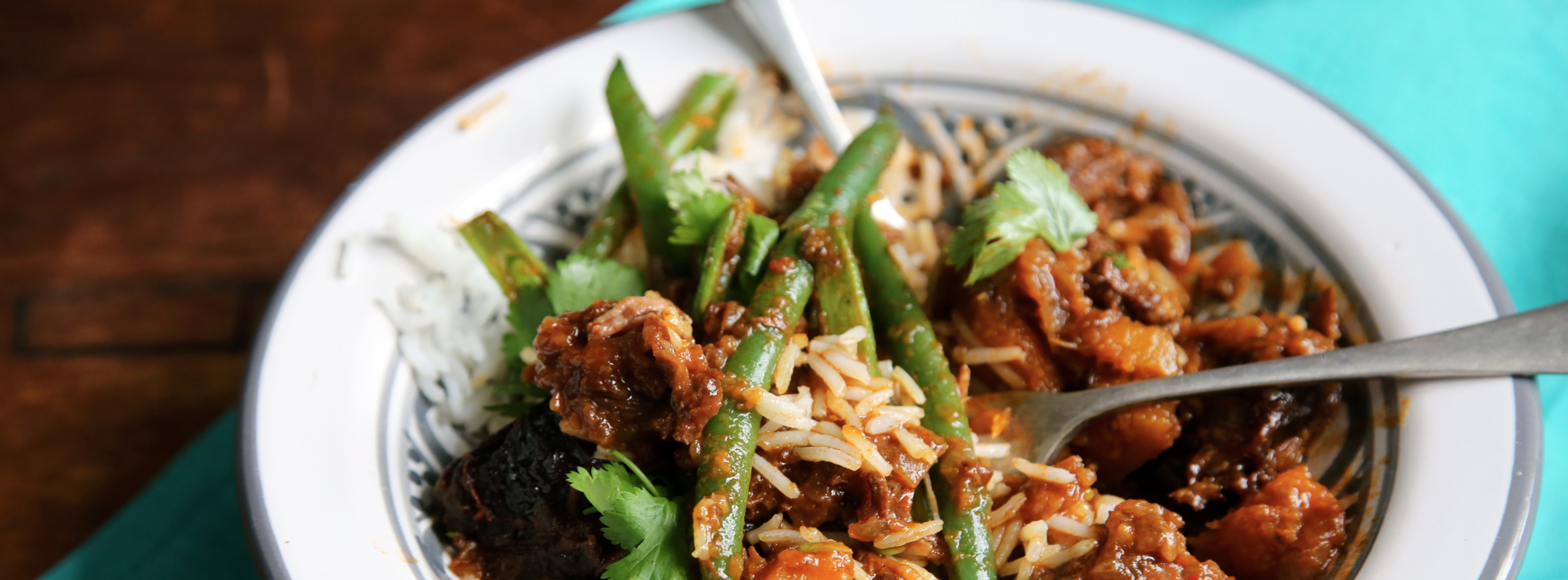
This one is a classic Moroccan dish, the fragrance of which will quicken the heart of anyone, whether fasting or not. It might take a bit of preparation, and you may need some extra equipment (a tagine pot) for optimal results, but if you have the means, it’s worth your while!
- 3 tbs olive oil
- 1kg diced lamb
- 2 tsp paprika
- ¼ tsp ground turmeric
- ½ tsp ground cumin
- ¼ tsp cayenne pepper
- 1 tsp ground cinnamon
- ¼ ground cloves
- ½ tsp ground cardamom
- 1 tsp salt
- ½ tsp ground ginger
- 1 pinch saffron
- ¾ tsp ground coriander
- 2 medium onions, halved and cut into wedges
- 5 carrots, quartered and sliced lengthways
- 3 cloves garlic, minced
- 1 tbs grated ginger
- 1 lemon zested
- 400ml chicken stock
- 1 tbs tomato puree
- 1 tbs honey
Toss lamb with 2 tablespoons of the olive oil, and set aside. In a large resealable bag, toss paprika, turmeric, cumin, cayenne, cinnamon, cloves, cardamom, salt, ginger, saffron and coriander. Add the lamb to the bag, and toss to coat well. Refrigerate at least 8 hours, preferably overnight.
Heat 1 tablespoon of olive oil in a large, heavy-bottomed pot over medium-high heat. Add 1/3 of the lamb, and brown well. Remove to a plate, and repeat with remaining lamb. Add onions and carrots to the pot and cook for 5 minutes. Stir in the fresh garlic and root ginger. Continue cooking for an additional 5 minutes.
Return the lamb to the pot and stir in the lemon zest, chicken stock, tomato puree and honey. Bring to the boil, then reduce heat to low, cover and simmer for 1 1/2 to 2 hours, stirring occasionally, until the meat is tender.
Rose petal pound cake
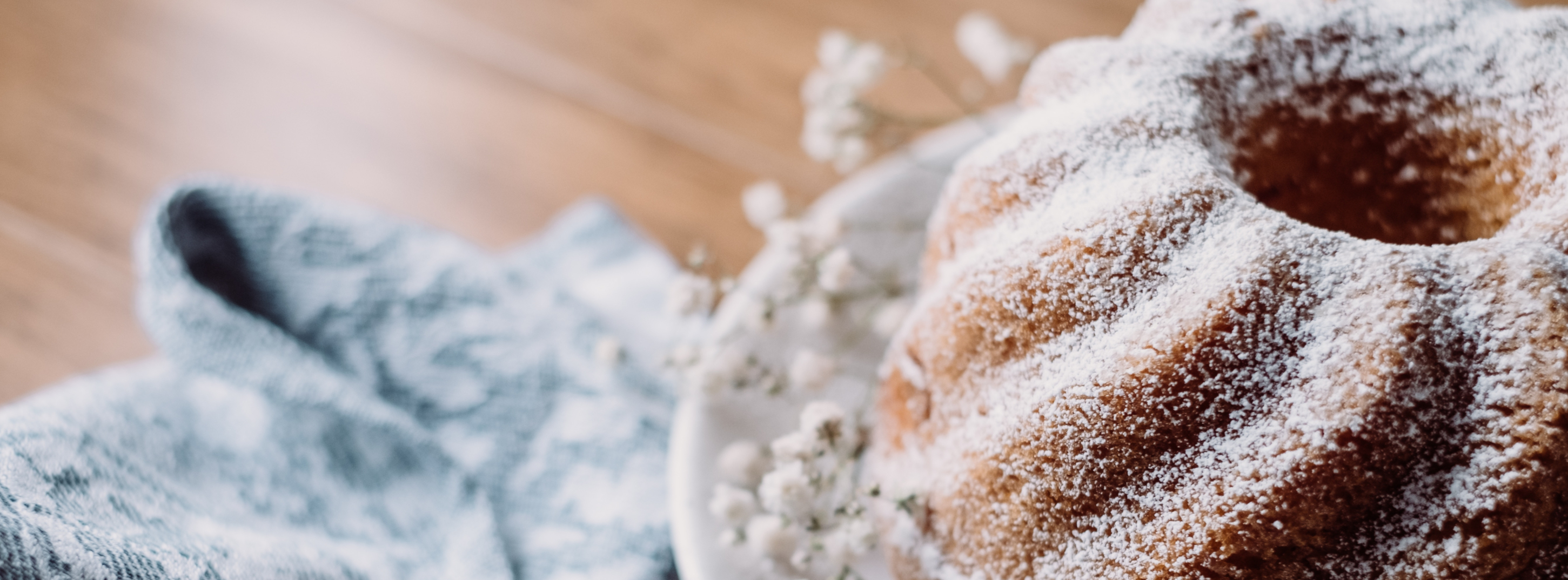
This traditional pound cake comes with a twist by using rose water, which you can find at most import shops or large supermarkets. In a pinch, you can also substitute the rose water for orange water. It will make a fragrant and delicious finish to a meal.
Ingredients
- 2 cups all-purpose flour
- ½ tsp salt
- 1 cup butter
- 1 2/3 cups white sugar
- 5 eggs
- 1 tsp almond extract
- 3 tbs ground almonds
- 1 tsp rosewater
- 1 tbs confectioners sugar
Preheat oven to 350 degrees F (175 degrees C). Grease one 9-inch tube pan.
Sift together flour and salt and set aside.
Beat butter in a mixing bowl until light and fluffy. In a separate bowl, beat sugar and eggs together until doubled in volume. The mixture should be thick and lemon-coloured.
Add sifted flour and salt gradually to the egg mixture, mixing until fully combined. Fold in creamed butter and mix thoroughly.
Divide batter into two equal parts. Into one part, add the almond extract and the ground almonds. To the other part, add the rosewater. Spoon the two batters alternately into the prepared pan.
Bake in the preheated oven until a cake tester comes out clean, 50 to 60 minutes. Let the cake cool for 15 minutes; then remove from pan to cool completely. Dust with confectioner’s sugar before serving.
~
We hope these recipes inspire you to create the best possible Suhoor and Iftar to make this year’s Ramadan extra special.
To keep up to date with the latest EPA news, return to our blog, or follow us on Twitter, Facebook, LinkedIn and Instagram.
See you around The Hive!













